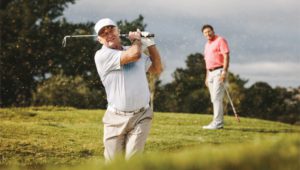 No matter how much you love your favorite sport, there are many reasons you might decide to take a break. A heavy work schedule, travel, sickness and weather are just a few of the temporary setbacks that could put a damper on your active lifestyle.
No matter how much you love your favorite sport, there are many reasons you might decide to take a break. A heavy work schedule, travel, sickness and weather are just a few of the temporary setbacks that could put a damper on your active lifestyle.
When you’re ready to get back in the game, whether that’s golf, tennis, swimming or bicycling, it’s important to proceed with caution. Here are a few tips from the American Academy of Orthopedic Surgeons to prevent sports-related injuries when resuming a more active lifestyle.
1. Increase your activity level gradually. Unless you’ve been physically active year-round, start slow to rebuild muscle strength and stamina. Don’t forget to warm up and cool down before and after each exercise session and to gently stretch. It helps keep muscles and joints flexible.
2. Avoid too much repetition. Cross training is the ideal way to approach getting in shape. It simply means varying your routine. Don’t book a tee-time on the golf course or play tennis every day of the week. Instead, mix it up to avoid stressing the same muscles and joints over and over again.
3. Give your body time to rest and recover. Don’t expect to be at the same peak level of performance if you’ve been inactive for a while. It’s also critical not to work through pain. Minor muscle pain and soreness is to be expected, but sharp pain is a warning sign of a more serious injury.
4. Schedule a physical. If you haven’t exercised in a while, are over age 50 or have had major health problems in the past, schedule an appointment with your physician before you take on too much physical exertion.
5. Use common sense. The sun is still strong in Southwest Florida. Stay hydrated by drinking plenty of water and wear sunblock to reduce the sun’s harmful UVA and UVA rays.
Finally, pay attention to the warning signs. The most frequent sports-related injuries include tendonitis, which presents in various forms such as golfer’s and tennis elbow and swimmer’s shoulder. Stress fractures and shin splints are among the most common complaints in runners. All of these are frequently evaluated and treated by orthopedic surgeons. Quite frequently, they are related to repetitive, overuse trauma to the body.
Swelling, reduced range of motion, numbness and tingling, muscle tenderness and joint pain are common symptoms of sports-related trauma to the body. Most of the time, conservative treatment, such as rest, application of hot or cold and over-the-counter medication, can help.
But if the pain is sharp, persists, wakes you up at night or prevents you from enjoying your favorite athletic activity, call an orthopedic specialist for a medical consultation. Anti-inflammatory medications and injections may be prescribed. Physical therapy can often provide some relief. But more serious issues may require arthroscopic diagnosis and treatment by an experienced orthopedic surgeon.
Edward R. Dupay, Jr, DOBoard Certified
Dr. Dupay graduated from Xavier University in Cincinnati, Ohio. He received his Doctor of Osteopathy at the University of Health Sciences, College of Osteopathic Medicine in Kansas City, Missouri.
Dr. Dupay completed his Internship and Orthopedic Surgery Residency at Flint Osteopathic Hospital in Flint, Michigan. Dr. Dupay has been in the Fort Myers / Cape Coral area since 1987. Dr. Dupay enjoys seeing the “Weekend Warrior” athlete.










